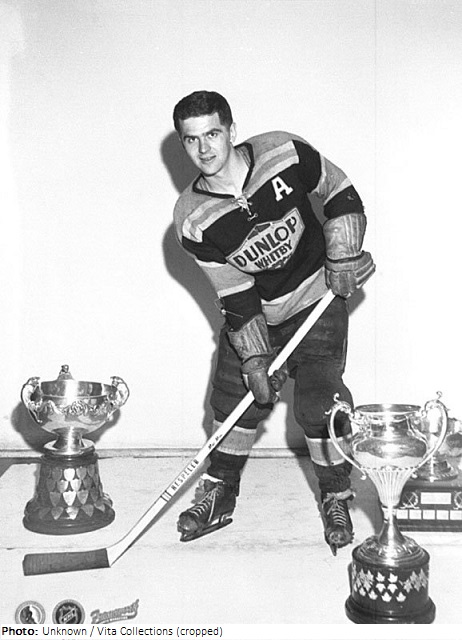Harry James Sinden began his lifelong affiliation with ice hockey as a defenseman with the Toronto Marlboro Bantams prior to joining the Oshawa Generals of the Junior Ontario Hockey League for four years, beginning in 1949. After Hambly Arena burned down in 1953, taking the Oshawa Generals with it, Sinden joined the temporary replacement team, the Ottawa Truckmen, and remained with them when they became the Whitby Dunlops in 1954. He won his first Allan Cup, given annually to the senior men’s ice hockey champions in Canada, in 1957 with the team, a victory that earned them the right to represent Canada at the 1958 World Championships. After a gold medal triumph at that tournament the Dunlops won the Allan Cup a second time in 1959, but turned down of the offer to play for Canada at the 1960 Winter Olympics. When the Kitchener-Waterloo Dutchmen accepted the call, Sinden was recruited to join them. At the tournament he played seven games, scored four goals, and took home a silver medal. He played 38 games with the Dunlops that season, but it was his last with the team. He was on the Montreal Canadiens negotiation list that year, but he was never signed to the team. After five playoff matches with the Hull-Ottawa Canadiens of the Eastern Professional Hockey League, he played with the Kingston Frontenacs until 1963. In 1962 he was named the league’s top defenseman (an honor shared with Jean Gauthier) and repeated the feat in 1963 (solo), in addition to being named MVP. In his final season he also served as player/coach with the Frontenacs and suited up for one game with the Providence Reds of the American Hockey League. His final three seasons were spent with the Central Pacific Hockey League, which began in 1963 and ended in 1968. He spent 1963 through 1965 with the Minneapolis Bruins (the successor team to the Frontenacs), functioning as player/coach for the first season, and then had a final year with the Oklahoma City Blazers (who in turn had succeeded the Bruins).
Sinden’s hockey career, however, was far from over. He was signed as head coach of the Boston Bruins of the National Hockey League in May 1966, and entered as the youngest coach in the league at the age of 33. Although his was the worst team in the NHL during his first year as coach, the Bruins began a rapid improvement: they had a winning record in his second season, were second in this league by his third, and won a Stanley Cup in his fourth. His success with the team, however, did not endear him to its management and he retired several days after this victory, taking a job with a home construction company. In 1972 he was offered head coaching jobs with the New York Islanders, the Toronto Maple Leafs, and the St. Louis Blues, but turned them all down. He finally accepted a position as head coach and manager of the Canadian team at the Summit Series, an eight-game Soviet versus Canada tournament, which Canada took four games to three, with one tie. Sinden’s tape-recorded account of the events was turned into a book entitled “Hockey Showdown”. Several days after the Summit Series he rejoined the Bruins, this time in the capacity of general manager, and held that position for 28 years. During the 1979-1980 and 1984-1985 seasons he temporarily took over the role of head coach midseason. In 1989 he was also made president, a title that he held until his 2006 retirement, and is now a senior consultant to team owner Jeremy Jacobs. In 1983 he was inducted into the Hockey Hall of Fame as a builder. His godson Gordon Downie was the lead singer of The Tragically Hip.

 Canada
Canada CAN
CAN